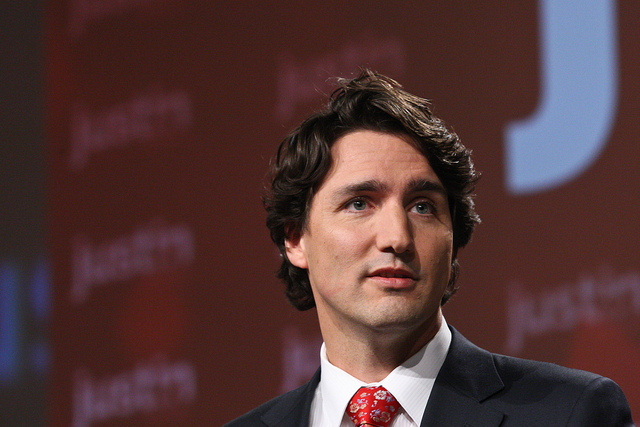In deciding not to oppose the adoption of Bill C-51, the Anti-Terrorist Act 2015, the Liberal Party of Canada has committed a serious error of judgment.
The Harper Conservatives have laid before the House of Commons legislation that would authorize the detention of Canadian citizens without evidence of committing a crime, but simply because they were thought possible of committing terrorist acts.
Bill C-51 empowers the government to transform CSIS — an intelligence-gathering agency — into a quasi secret police with the power to lock up citizens suspected to have shown support for a cause deemed terrorist by the government.
The bill creates “a new speech-related criminal offence of ‘promoting’ or ‘advocating’ terrorism” according to a CCPA legal primer.
Speaking out in favour of Palestinian Hamas — elected in the past — but deemed to be a terrorist organization by Canada — would be enough to send someone to prison. World leader Nelson Mandela was condemned as a terrorist for opposing apartheid by measures including violence. Singing “Free Mandela” would have been a dangerous act under this law.
The Harper government believes it can prey on natural fears for security, and drive a wedge between itself and the opposition parties. The Liberals do not want to give the Conservatives that advantage.
Showing caution in responding to a massive document that amends a series of other parliamentary acts, the Official Opposition took its time before announcing its decision to oppose Bill C-51. It then went on to filibuster for expanded examination of its provisions in committee.
NDP heavyweights Ed Broadbent and Roy Romanow wrote a sharp critique.
Expert analysis by law professors Craig Forcese and Kent Roach in five different backgrounders has revealed the worst aspects of the bill.
Former prime ministers and Supreme Court judges presented detailed objections. Over 100 academics signed an open letter calling all MPs to oppose C-51.
The Liberal party has focused on the lack of oversight for the new anti-terrorist powers. It is difficult to imagine what form oversight would take once the powers have been granted. Political scientist Philippe Lagassé asks: would a parliamentary committee be allowed access to state secrets so they could critique the government in public? Hardly. Better not to grant excessive powers to secret agencies in the first place.
One reason the Liberals have not made much of Bill C-51 is that in 2001 a Liberal government brought in Bill C-36, a draconian piece of anti-terrorist legislation cobbled together in the wake of the attacks on the World Trade Centre that itself raised serious questions about infringements of human rights.
The Justin Trudeau approach to politics has a lot to recommend it — if you have the charisma and name recognition of a celebrity — which he alone among Canadian politicians has got. The Liberal leader likes to get out and meet people. He draws a crowd, learns something from his conversations, practices his lines, and connects with Liberals on the ground.
Recently the Liberal leader has begun to flesh out his policy positions. The Liberal leader addressed the Canadian Council on Public-Private Partnerships to make his argument for the benefits of infrastructure.
Public sector trade unions such as CUPE and NUPGE have tons of research shooting holes in the P3 approach to building infrastructure.
Trudeau and his advisers preferred to have him speak to a business group about its pet project rather than address the mistakes being made around the world with P3 projects. It seems fair to say the Trudeau Liberal party does not want to get out of step with business leaders even when they are wrong.
The Liberal leader made a major speech on the economy to the Montreal Board of Trade last week. An underlying theme in that speech was that the Conservative government is trying to buy votes in the next election by offering income-splitting tax relief, and tax credits for well-off families. Of course political parties try and drum up voter support — that is why they field candidates and contest elections.
In an earlier speech to the Petroleum Club in Calgary, Trudeau pointed to the Conservatives making foreign policy in search of domestic support. Then he did it himself by softening his position on the Canadian military mission to Iraq.
This weekend Trudeau said an extension of the Iraq mission should be considered. This was an operation he had earlier criticized (and had been criticized for opposing) and that had put him offside with Lloyd Axworthy, a former Liberal foreign minister and Bob Rae, the former interim Liberal leader.
This past weekend, Deborah Coyne, former adviser to the Liberal caucus, Liberal candidate against Jack Layton, and Liberal leadership candidate in the race that elected Justin Trudeau, announced she was joining the Green Party as an adviser to Elizabeth May. Coyne wanted to support “principled leadership.”
The personal appeal of Justin Trudeau will not be enough to cover for an unwillingness to stand up and be counted on crucial issues. A Liberal party that lets criminalization of dissent go unopposed needs to be asked how it defines liberalism.
Duncan Cameron is the president of rabble.ca and writes a weekly column on politics and current affairs.



